Notwithstanding the protracted nature of the NTP v. RIM litigation, the ungodly expense, the out-of-control jury verdicts and the (inevitable?) settlement, the patent wars proceed apace. Here are some links to just a few of the ongoing disputes.
(If you don’t like the “Star Wars” reference, the size of the companies involved has inspired some to characterize these suits as “Clash of the Titans.”
Or maybe James Bond???
Pick your movie metaphor of choice.)
First, there are the “patent trolls,” following in the footsteps of NTP????
Then there are the suits involving Apple, which almost deserve a class of their own:
Apple sues Samsung for the “slide to unlock” feature (among others). And wins. (Note the quote here: “”I don’t know if $1 billion is hugely significant to Apple or Samsung,” [investment banker Christopher] Marlett said. “But there is a social cost here. As a company, you don’t want to be known as someone who steals from someone else. I am sure Samsung wants to be known as an innovator, especially since a lot of Asian companies have become known for copying the designs of innovators.”)
Really? Well, check out today’s headline: “Samsung patent lawsuit would have left blind iPhone users in the dark.” Samsung holds a German patent on the text-to-voice technology that Apple puts in its iPhone. Samsung requested an injunction in a German court, and didn’t get it. And the headlines come out overwhelmingly against Samsung. So, I guess it’s OK if Apple uses someone else’s patented technology, but not OK if another company does it? Or does it just prove that Apple does a better job with p.r.?
But wait! There’re more! The other big players are also involved ….
(settles…)
i4i sues Microsoft and wins …
Google (Motorola Mobile) sues Microsoft …
Oh, hell, let’s just show ’em all……
And then there are those who blame the system….
Breaking: Could some of the “big boys” finally be tiring of the game????
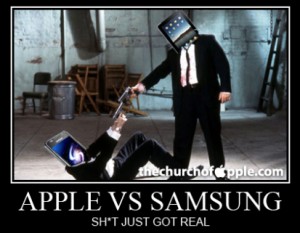
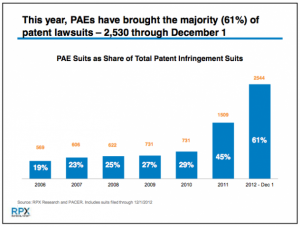
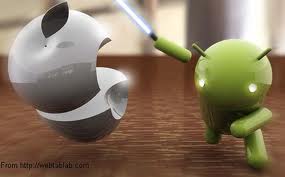
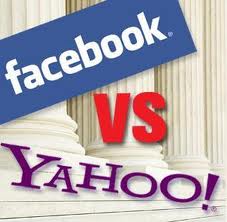
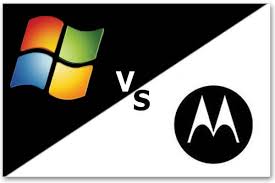
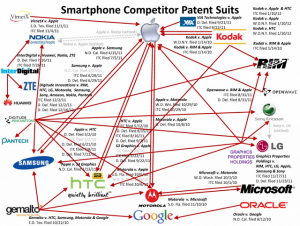
With all of the lawsuits (though they seem to be dying down), it appears that there must be some way that the system is failing. The patent system is supposed to promote innovation in an efficient manner by granting a limited exclusionary monopoly on the the claimed invention. However, it seems like the patents are not being used in their proper roles, but rather as swords and shields for infringement claims over minor concerns.
Two ways to fix this possible failure would be to mandate licensing at a market rate or to raise the bar for obviousness for patent grants. The issue with mandatory licensing would be that there must be some method to determine the value of the compulsory license, but each patented invention may be valued extremely differently. To “solve” the failure, litigation would have to be diminished, but without threat of litigation, there is no shadow of a penalty for appropriating a patent, and therefore no reason to pay anything other than a nominal fee for a license.
On the raising of the bar for obviousness, there would have to be a systematic change at the USPTO, and the changes would come slowly. The AIA, with the post-grant third party “challenges,” may have moved to a type of common ground, where the USPTO itself does not have to change, but interested third parties may challenge a newly granted patent for their own reasons.
The “sword” versus “shield” observation is a good one. But is the problem the patent system? Or is it something else? I mean, the system has been in place for a long time – what has changed?
Is it that what is being developed is digital, amorphous, non-tangible (e.g., software), and thus not capable of physically controlling the way traditional inventory, products, and manufacturing processes were?
Is it that “business method” patents are causing the problem and need to go the way of the dodo? (Supreme Court had a chance to kill those, and probably should have…)
Is it that the way we do business has changed? Not sure about that — business has always had its cutthroats. But now they spend their time in court, instead of in the marketplace, winning.
Just throwing out some further thoughts for discussion.
Here is an interesting podcast involving patent trolls. The title of the podcast is “When Patents Attack.” It aired on July 22, 2011. Those of us who took the Patent Litigation Seminar with Profess with Schwartz in Fall 2011 had this assigned for the course. I think that it is very interesting and ties in perfectly with our patent war discussion.
The key takeaway from the podcast is how incredibly damaging the entire patent system is to actual innovation today, and how pretty much everyone in Silicon Valley recognizes it — but many are afraid to speak out about it, because they fear getting targeted by flat out bullies like Intellectual Ventures. Our government keeps talking up the importance of innovation and job creation… and then leaves us saddled with a patent system that does everything possible to hinder innovation and destroy companies. I’m glad that mainstream outlets like This American Life are covering the story. I just wish I were more optimistic that it would actually result in some kind of change.
Here is the podcast:
http://www.thisamericanlife.org/radio-archives/episode/441/when-patents-attack